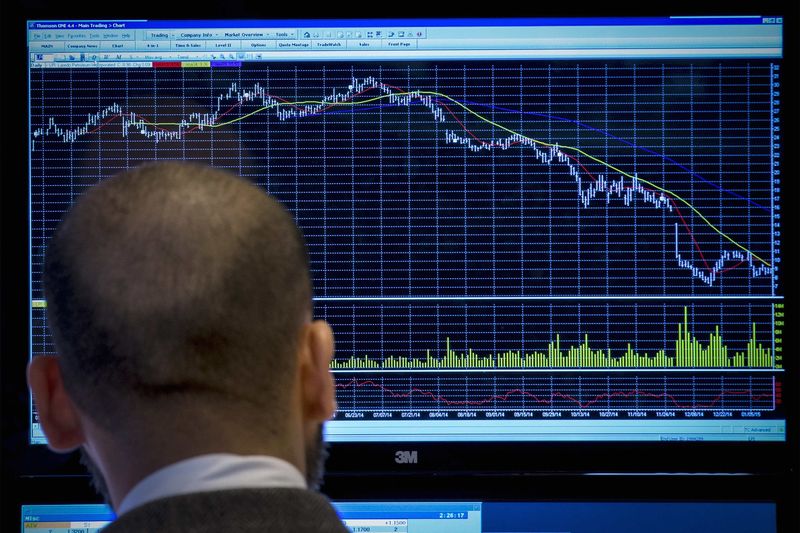Investing
Japan stocks soar as yen hits 1-year low

© Reuters. A passerby is reflected on an electric monitor displaying the graph of recent moments of the Japanese yen exchange rate against the U.S. dollar outside a brokerage in Tokyo, Japan May 2, 2023. REUTERS/Issei Kato/File photo
By Kevin Buckland
TOKYO (Reuters) – Japanese stocks soared on Monday, with the exporter-heavy share average buoyed by the yen’s slide to its lowest point in a nearly a year and after the U.S. avoided a government shutdown.
However, the rest of the region’s equity markets were mixed, with Australia’s oil and resource shares hurt by the decline in crude prices last week.
Trading was also thinned by a market holiday in Hong Kong, while mainland China had been shut since Friday for the Golden Week holiday, which runs until the end of this week.
The Nikkei jumped to be 1.6% higher as of 0100 GMT, rebounding from its lowest close in more than a month at the end of last week.
U.S. stock futures rose 0.6%, pointing to a rebound from the ‘s 0.3% drop on Friday.
The weekend’s last-minute stopgap funding bill allowed the government to keep operating through Nov. 17, and means key data releases including Friday’s monthly payrolls report can go ahead on time.
“The shutdown risks are only delayed, not eliminated,” TD Securities strategists wrote in a client note.
“A sense of reduced uncertainty is likely to drive a small relief in markets,” but “market volatility is likely to remain elevated as investors wait for the next catalyst, which is likely to be top-tier data.”
Japanese stocks were also boosted by the Bank of Japan’s quarterly Tankan survey, which showed an improvement in business sentiment.
At the same time, the yen slid on Monday to its lowest since Oct. 21 at 149.74 per dollar, even as the broader rally in the U.S. currency took a breather following the ‘s climb to a 10-month peak last week.
A weaker yen increases corporate earnings garnered abroad when they are repatriated.
Elsewhere in the region, the mood was more muted. South Korea’s Kospi rose 0.1%, while Australia’s benchmark stock index edged down 0.05%.
In addition to the drag on energy and other resource shares, Australian investors were also cautious ahead of a Reserve Bank policy decision on Tuesday, the first under new governor Michele Bullock.
New Zealand’s central bank sets policy on Wednesday. The country’s stock benchmark fell 0.5%.
Declines in Antipodean equities came despite fresh signs that the economy of key trading partner China may be stabilising. Although a private gauge of factory activity in data over the weekend unexpectedly declined, it stayed in expansionary territory – a day after official data registered the first expansion in six months.
recovered some ground from Friday’s 1% tumble, as the positive news from the U.S. and China improved the outlook for demand. [O/R]
December crude futures rose 18 cents, or 0.2%, to $92.38 a barrel after falling 90 cents at the end of last week. U.S. West Texas Intermediate crude futures gained 23 cents, or 0.3%, to $91.02 a barrel, after losing 92 cents on Friday.
Read the full article here

-

 Investing6 days ago
Investing6 days agoBank regulator gives BlackRock new deadline on bank stakes, Bloomberg reports By Reuters
-

 Side Hustles5 days ago
Side Hustles5 days agoHow to Craft Marketing Campaigns That Reach Multiple Generations
-

 Side Hustles5 days ago
Side Hustles5 days agoLA Rental Prices Skyrocketing Despite Price Gouging Laws
-

 Side Hustles6 days ago
Side Hustles6 days agoFormer Zillow Execs Target $1.3T Market
-

 Side Hustles2 days ago
Side Hustles2 days agoWhy the Best CEOs Think Like Anthropologists
-

 Side Hustles3 days ago
Side Hustles3 days agoWhat to Do If TikTok is Banned — How to Protect Your Brand
-

 Side Hustles6 days ago
Side Hustles6 days agoZillow: These Are the Top 10 Hottest Housing Markets of 2025
-

 Make Money3 days ago
Make Money3 days agoEarn More in 2025: Top 10 High-Yield Savings Accounts Revealed


















